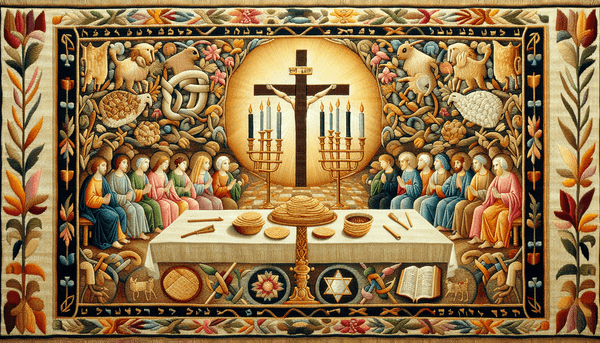The Unchanging Nature of God's Love and Faithfulness (Psalms 89:2)
In Psalms 89:2, we are reminded of the strength and comfort that comes from recognizing the unchanging nature of God's love and faithfulness. 'I will declare that your love stands firm forever, that you have established your faithfulness in heaven itself.' This verse serves as a beacon of hope, especially during times of uncertainty, reminding us that the steadfast love of the Lord endures all circumstances. As Lamentations 3:22-23 poignantly states, 'Because of the Lord's great love we are not consumed, for his compassions never fail. They are new every morning; great is your faithfulness.' The assurance of God's unwavering presence is echoed in Hebrews 13:8, 'Jesus Christ is the same yesterday and today and forever,' encouraging us to trust in a foundation that will not be shaken amidst life's transient nature.
The Inner Journey and Gnostic Perspectives on Seeking
The quest for spiritual understanding often leads one to explore the Gnostic tradition, which places emphasis on the inner journey and the pursuit of knowledge, or gnosis. This path of self-discovery and seeking inner truths is illuminated in Jesus' teachings, such as in Luke 17:21, 'Nor will people say, ‘Here it is,’ or ‘There it is,’ because the kingdom of God is within you.' Meditation, a core practice in Gnosticism, serves as a conduit to the divine spark within, allowing for personal insight into the nature of existence and one's relationship with the divine. The encouragement to seek and find is found in Matthew 7:7, 'Ask and it will be given to you; seek and you will find; knock and the door will be opened to you,' highlighting the active role one must take in their spiritual journey.
Conclusion
As we conclude our exploration of these biblical insights, we are reminded of the profound impact that these ancient texts can have on our contemporary spiritual lives. From the unwavering nature of God's love to the joy of living within His presence, and the personal quest for inner wisdom, these themes resonate with the enduring human pursuit of meaning and connection. Whether through traditional faith or the mystical paths of Gnosticism, the Bible invites us to engage deeply with its teachings, finding solace and strength in the face of life's challenges, integrating them into the fabric of our daily existence, and in doing so, enriching our understanding of ourselves and the divine.
FAQ
Q: What does Psalms 89:15 mean to us today?
A: Psalms 89:15, which states, 'Blessed are those who have learned to acclaim you, who walk in the light of your presence, Lord,' speaks to the blessings that come to those who wholeheartedly praise and honor the Lord, and who live in His presence. It emphasizes the importance of recognizing and acknowledging God's sovereignty and goodness in our lives. In today's context, it reminds us of the significance of cultivating a lifestyle of praise and worship, as well as the value of seeking and walking in the light of God's presence.
Q: How do Gnostics view the concept of meditation in the spiritual journey?
A: Gnostics view meditation as an essential practice in the spiritual journey, serving as a means to access the divine spark within and to gain personal insight into the nature of existence and the self. Meditation is seen as a pathway to achieving gnosis, or spiritual enlightenment, and is a practice that supports the Gnostic emphasis on inner revelation and the pursuit of deeper truths.
Q: What does Luke 11:9-10 mean in a more Gnostic sense?
A: In a Gnostic sense, Luke 11:9-10, which encourages asking, seeking, and knocking, can be interpreted as an invitation to embark on an inner journey of discovery. This passage emphasizes the active pursuit of spiritual truths and the belief that through seeking, one can uncover deeper layers of knowledge and connection with the divine, a key aspect of Gnostic philosophy.
Q: What does Psalms 89:2 mean to us today?
A: Psalms 89:2, which states, 'I will declare that your love stands firm forever, that you have established your faithfulness in heaven itself,' reassures us of the enduring nature of God's love and faithfulness. In our modern context, it offers comfort and assurance during times of uncertainty and difficulty, and encourages us to trust in God's steadfast love and unwavering faithfulness, knowing that these qualities are not subject to change or circumstance.






